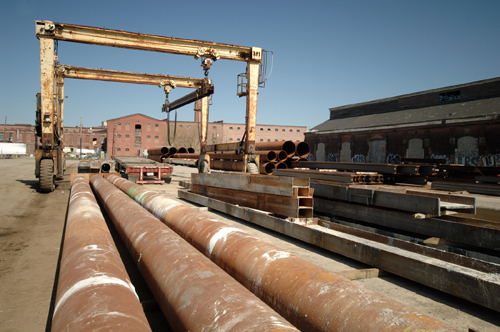
City planners and revitalization advocates in Pawtucket are applauding a R.I. Supreme Court decision earlier this month that, they say, will keep a heavy industrial use out of a downtown that is becoming increasingly residential and retail-oriented.
The decision was part of a long-running battle that began in 2002 between the city and Pawtucket Transfer Operations (PTO), a subsidy of New Jersey-based Transload America Inc., a waste-removal company that operates by rail, said Michael Cassidy, Pawtucket’s director of planning and redevelopment.
The city had argued that a site – the 7.5-acre Providence and Worcester Railroad freight yard at the junction of Goff and Pine streets – was not zoned for a use proposed by PTO. The company had intended to build a transfer station that would handle construction trash.
“The plan, as proposed by the developer, was to build a huge building, process demolition debris and send it out by rail,” Cassidy said recently.
Cassidy said the company had planned to handle about 2,000 tons a day. He said the proposed project would have cut down on future commercial and residential development prospects.
Cassidy said that, from a planning standpoint, having a downtown transfer station there didn’t fit with the city’s plan for the area. “They were talking about 500 trucks a day hauling construction and demolition dumpsters right through downtown,” he said. Many of the nearby buildings are zoned “commercial downtown,” a use that includes residential, he said. And residential uses – like the neighboring mill redevelopment Union Wadding Company, which will open 200 residential lofts this summer – wouldn’t fit in a neighborhood with all that trucking, Cassidy said.
A facility of that size would have made it the second-largest such facility in New England, said Rich Davis, executive director of The Pawtucket Foundation. He added, “We just knew that an operation on that scale, located right in our center city area … would have been a very, very difficult use to accommodate.”
The city’s decision in July 2004 to disallow the development was based on the language of the Pawtucket Zoning Ordinance. A refuse transfer station is listed among the 23 possible uses for the property. But that didn’t qualify the site for a construction and demolition transfer station, the city argued.
“Both of them are licensed by the State of Rhode Island, but both of them have separate, distinct licenses,” Cassidy said. “One is for a C&D facility and one is for a refuse transfer station. They have different standards, different requirements and different licenses.”
So, the city told PTO that they needed a variance in order to bypass the existing zoning. The company instead filed suit in R.I. Superior Court, where it won a favorable ruling. After that victory, PTO Executive Vice President Mike Wellman told Providence Business News that the transfer station would have brought between 10 and 15 jobs to the city, as well as about $1.5 million to the city’s economy each year.
Pawtucket Transfer Operations last week diverted calls to Transload America for comment. A message left for the company’s Rhode Island spokesman was not immediately returned.
Neighborhood groups, including The Pawtucket Foundation and the Pawtucket Alliance for Downtown Success, responded to the court ruling by successfully petitioning to bring the case to the Supreme Court.
The high court on April 9 reversed the lower court’s ruling. Justice Francis X. Flaherty wrote that the court “cannot conclude that the massive scope of the commercial operations proposed by PTO was contemplated by the city council when it enacted [the zoning ordinance], or that it intended to permit such a use.”
Cassidy said the decision sets an obvious precedent for zoning in Pawtucket: “If it’s not in the zoning ordinance, if it’s not listed – it’s not allowed.”
For now, there are no plans to rezone the affected land or adjacent parcels. Light industrial, with a few trucks coming and going each day, would be a fine use for the parcel, he said.
“This is right on the edge of the city’s downtown,” Cassidy said.
The Pawtucket Foundation’s Davis said the rail yard is a site that was identified by engineers Vanasse Hangen Brustlin Inc. as a potential location for a commuter rail station.
“They indicated that, at least for technical purposes, the commuter rail – the MBTA rail – could really stop at two places in Pawtucket,” he said. “And this was one.” •










